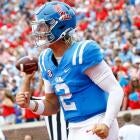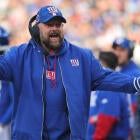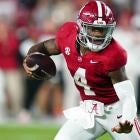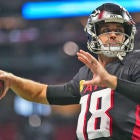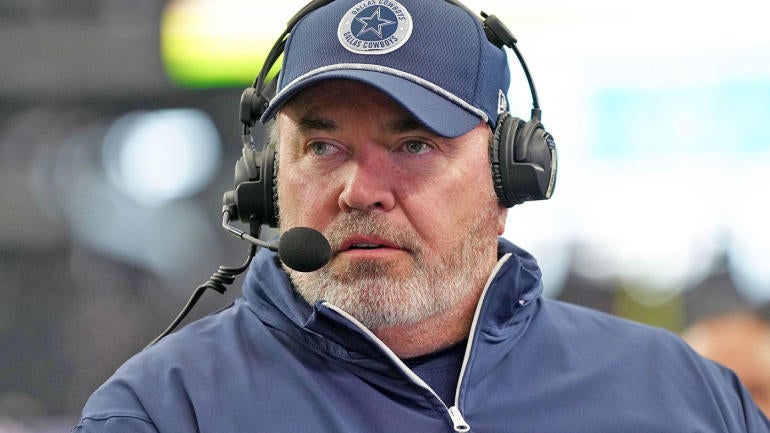
The Dallas Cowboys have won three of their last four games, heading into their Week 16 Sunday night game against the Buccaneers, and because they are perhaps the most results-over-process organization in the NFL, there has accordingly been a groundswell of chatter about head coach Mike McCarthy returning next season. That would not be a good idea.
McCarthy was hired in 2020 and given a very simple, very low bar to clear: Do better than Jason Garrett, who in a decade as the Cowboys' head coach failed to get the team beyond the divisional round of the playoffs and indeed won only two playoff games. McCarthy has not cleared that bar. Dallas has still yet to make an NFC title game, by the end of this season will have won only one playoff game in five years (the same rate as Garrett), and has indeed been utterly embarrassed in all three of its playoff losses -- each somehow worse than the last.
After the second consecutive embarrassing playoff loss to the 49ers, McCarthy parted ways with then-offensive coordinator Kellen Moore and took over the play-calling responsibility himself. Many point to the season-long results in 2023, wherein the Cowboys finished fifth in yards and first in points and Dak Prescott was a second-team All-Pro who finished second in MVP voting, and declare him a success.
Such a formulation ignores the fact that McCarthy's plan coming into the season was so bad that it took CeeDee Lamb throwing a public tantrum for Dallas to shift away from a run-heavy, short-passing, ball-control attack to what was quite obviously the team's best path: turning the offense over to Prescott and Lamb and letting them go to work. Only after doing that did the Cowboys start to take off. Pivoting in a new direction is admirable, and worthy of praise. Having an initial plan that is so unsuccessful that your best offensive player has to publicly call it out to get you to swing in a different direction, is worthy instead of criticism.
Even after making the pivot, it's not like McCarthy was scheming his offense into position for success. Despite their much-publicized shift to what Prescott called the "Texas Coast" offense (a fusion of McCarthy's West Coast principles with the offense the team had run under Moore), the Cowboys were still among the league leaders in stagnant formations and stagnant route concepts. Prescott had the sixth-highest tight-window throw rate out of 45 qualified quarterbacks, according to NFL.com's Next Gen Stats. It was only by virtue of his outperforming his expected completion percentage by 4.7% that the Cowboys were able to succeed with that offense.
They counted more on the players to beat the defense, than on giving them advantages through scheme. The system was essentially, "Dak and CeeDee, go be superheroes." When they actually did that, things worked great. (At least until the playoffs. More on that in a second.) But when they came into this season with the exact same plan -- despite having downgraded across the offensive line, which would obviously make enacting said plan considerably more difficult -- and Prescott was unable to outperform his surroundings at the same level, the offense was considerably below average.
Given that McCarthy is a play-calling offensive head coach, his major selling point should be an ability to get more than expected out of the talent on hand. For the most part, he hasn't done that -- and especially not in big games. The offense has disappointed in a major way in crucial moments, including earlier this season in losses to the Ravens, Lions, 49ers and Falcons, prior to Prescott's season-ending injury. And that's before we get to the three playoff losses to the 49ers and Packers, which were characterized by tremendous offensive failings. (The pre-garbage time offensive ineptitude in last year's loss to Green Bay was overshadowed by the abominable defensive performance.)
Before taking over play-calling himself, McCarthy was a CEO-style head coach, which meant that his main responsibilities were in preparation, overall philosophy and game management. Given the aforementioned issues in big games, which often came complete with incredibly slow starts on both sides of the ball that the Cowboys then had to overcome, it's hard to say that he was giving the team a leg up in the preparation department. The fast-paced, pass-heavy philosophy they had during the first three years of his tenure was seemingly more a function of Moore than McCarthy, considering the changes McCarthy made once he fully took over. So it's tough to give him credit for that, either. And on the game management front, McCarthy has been a negative going back to his time in Green Bay. Fourth-down decision-making, timeout usage, pre-snap penalties ... all of those have been consistent issues since he took over in Dallas.
It's not like any of this should have come as a surprise, either. All of these problems were evident at the tail end of his tenure with the Packers -- especially the stagnant offensive system and the game management. But a year away from the league and a public relations tour that he admitted in his introductory press conference was essentially a sham, led to a rehabilitation of his reputation. Or enough of one for Jerry Jones to turn in his direction, anyway. And make no mistake, they were going to hire him no matter what. The Cowboys conducted exactly two "interviews" during their "search" to replace Garrett: One with McCarthy, and one with Marvin Lewis, to satisfy the Rooney Rule. They had zero intention of turning anywhere else.
The Joneses love to cite the fact that McCarthy is a Super Bowl winner as evidence of his bona fides. (It's no accident that they remember that Super Bowl well, because it was the first one to take place in what was then called Cowboys Stadium. If that game had been played elsewhere, it would not be at all surprising if McCarthy didn't get this job in 2020.) But even accounting for that, McCarthy's Super Bowl victory came during the 2010 season. Tom Coughlin, Pete Carroll and John Fox have all won Super Bowls more recently. Is anybody kicking down their doors? Even Doug Pederson is about to get fired for a second time since winning his Super Bowl, seven years after McCarthy won his. McCarthy's two best players, Lamb and Parsons, were each 11 years old when he won his Super Bowl. It's just not a relevant factor anymore -- or at least, it shouldn't be.
Are the Cowboys (6-8) playing hard for McCarthy down the stretch of this season? Sure. But that shouldn't be a feather in his cap. That is the absolute bare minimum requirement for a head coach.
If a coach isn't giving you a major advantage either in your preparation or with his schemes on Sundays, you should be turning over every stone in search of one who does. Just because the name brand options available aren't sexy enough doesn't mean you should stick with what you have and not try to find something better. The Packers knew that when they fired McCarthy and replaced him with Matt LaFleur, who was not necessarily anybody's idea of an elite head coach coming off a season where his Tennessee Titans offense was pretty average. Only true sickos had even heard of Sean McVay when the Rams hired him. The Ravens hired a special teams coordinator to take over for Brian Billick, and John Harbaugh has been one of the NFL's best coaches ever since.
There are really good coaches out there, and often in unexpected places, if you actually want to find them. The problem, as always, is that the Cowboys aren't looking for a football coach so much as they are looking for someone to do press conferences and act as the coach of what appears to be a football team but is more so just a marketing apparatus. As such, their standard for a head coach is not excellence or even Super Bowl contention, but mere relevance. Mike McCarthy can make you relevant. He's not going to make you more than that. The Cowboys should try to find somebody who can.
![[object Object] Logo](https://sportshub.cbsistatic.com/i/2020/04/22/e9ceb731-8b3f-4c60-98fe-090ab66a2997/screen-shot-2020-04-22-at-11-04-56-am.png)













